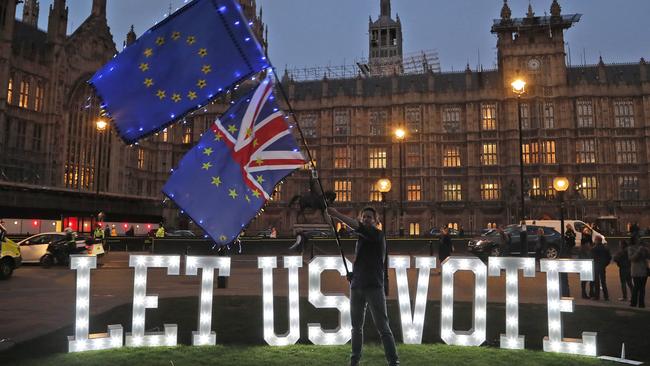Meaningless mantra set the agenda and sealed May’s fate

Three things brought Theresa May to her resignation statement and to the premature end of a premiership that once looked as though it would last for many years. Two big decisions and her political character.
The first big decision was to announce, at the outset of her leadership campaign, that “Brexit means Brexit”. A slogan that was attacked as meaningless and inscrutable in fact articulated an important choice she had made. If she became leader there would be no second referendum and no “Norway” acceptance of EU rules. She would take Britain out of the bloc and would attempt to negotiate an entirely new relationship with our partners, one in which we were not in the customs union or the single market. She formalised this in a speech at Lancaster House.
This was not just an economic and diplomatic choice, it was also a political one. It meant taking as her primary political allies those who had promoted Brexit and adopting a broader outlook and rhetoric designed to appeal to Leave voters. This was not her natural base of support and in the end it left her relatively politically friendless.
An early choice was to sack George Osborne and remove many of his allies from the government. This was consistent with the basic decision she had made, and went down well with the supporters she was trying to attract, but angered many people who might otherwise have sustained her. Making the quintessential insider Sir Oliver Letwin into an outsider is an example. It also denied her the talents of what had been a pretty successful Cameron operation. Bringing Boris Johnson on board proved a poor substitute in terms of ability and loyalty.
Picking the path of “Brexit means Brexit” also determined her domestic agenda. As well as appealing to Brexiteer MPs, the new prime minister would appeal to Brexiteer voters. The referendum was interpreted as having wider significance. It was a signal from voters who were “just about managing” that they were deeply fed up. So, with a well-received, well-written, but wildly ambitious statement on the steps of No 10, Mrs May signalled that the Conservatives would be less the party of big business and more aimed at those left behind by globalisation.
Her party conference attack on the “citizens of nowhere” and the importance she attached to ending free movement of people further alienated liberal opinion, which might otherwise have been quite open to her.
The start of her premiership was an extended honeymoon and the political choice she had made, while contentious, was coherent. But Mrs May had set herself very difficult tasks. Even while continuing a policy of spending control, she had offered a radical response to the problems faced by the working poor. And she offered to find a way through on Brexit that had never been found before.
Which led her to the second big and consequential decision. She would hold an early general election. She did not inherit a majority big enough to carry either her domestic agenda or to land a Brexit that meant Brexit. So her first choice really determined this second one. It seemed a robust one. With Jeremy Corbyn as leader of the opposition, success seemed assured. However, she had chosen to seek a third term for her party at a time when real incomes were falling and when high views of her abilities and low views of his were not stable. When she did not perform well in the campaign her honeymoon came to a sudden end, as honeymoons often do. They rarely do it in the last couple of weeks of an election.
But there was something else. Mrs May’s decision to appeal on a platform of “Brexit means Brexit” changed the political battleground. The Tories appealed less as a free market party of economic prosperity and more as the party of Brexit in Leave seats. They won votes in these areas without winning many new seats. In more urban, prosperous areas the party lost seats. And she lost her majority.
From the moment this happened her premiership was holed below the waterline. Some of her new Brexit allies deserted her when the deal she attempted to negotiate began to look tricky. This wasn’t helped by losing Nick Timothy, her chief of staff who had guided much of her Brexit strategy.
She negotiated a withdrawal agreement but has not been able to get it through the Commons. And now the Brexiteers have demanded her departure in return for their accepting reality. She doesn’t have enough close allies left to resist it.
So she is resigning because of her two big decisions. And also her political character. Critics regard Mrs May as stolid, silent and lacking entirely in flair and imagination. A more generous interpretation is that she is self-contained, shy but also driven, very stubborn and with a strong sense of duty. This robbed her of the ability to free herself with one brilliant stroke of the sword. But her single-mindedness means that she is willing to do almost anything, put up with almost any humiliation, to succeed in the end. Whether this is remembered as extraordinary dedication or lamentable lack of creativity will depend on something we don’t know yet. Whether, finally, she gets her deal through.
The Times


